National University of Health Sciences (NUHS) announced that interns from its master’s degree programs in acupuncture and oriental medicine are now working in a clerkship program at John H. Stroger, Jr. Hospital of Cook County of the Cook County Health & Hospitals System (CCHHS). The interns are treating patients with acupuncture in the hospital’s specialty clinic for pain management.
Frank Yurasek, PhD (China), MSOM, Assistant Dean for Acupuncture and Oriental Medicine at NUHS, was recently appointed as an Attending Physician at the John H. Stroger Jr. Hospital, supervising the NUHS interns and assisting in patient care.
“This is a historic step for both our university and the acupuncture profession. We are bringing acupuncture care for chronic pain to one of the largest urban hospitals in the nation,” says Dr. Yurasek. “We are demonstrating that oriental medicine can provide cost-efficient and effective care in a western medical environment challenged with a high volume of patients.”
Four NUHS interns were initially scheduled to provide acupuncture for approximately 50 patients each Thursday. After just a few short weeks, due to the initial success of the program and patient demand, the hospital has already added acupuncture on Wednesdays to the clinic schedule as well.
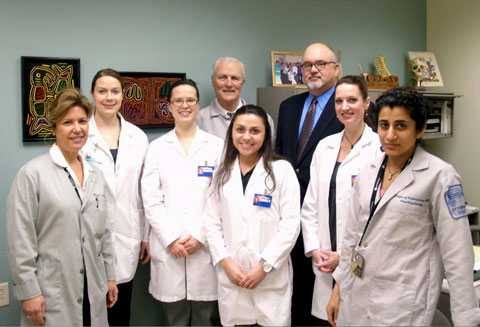
(L-R) Dr. Maria L. Torres, Chair, Pain Services, CCHHS; Intern Greer Nesbitt; Intern Misty Blomquist;
Dr. Frank Yurasek, NUHS Asst. Dean of Acupuncture and Oriental Medicine; Intern Erica Garcia;
Dr. David Parish, NUHS Dean of Clinics; Intern Mary Thuermer;
Gennadiy Voronov, M.D., Chairman, Anesthesiology and Pain Management, CCHHS
Advantages of Integrative Medicine
The new acupuncture clerkship program reinforces NUHS’ commitment to integrative medicine. Integrative medicine brings different health care specialties together in educational and clinical environments so that they can combine their expertise for better patient outcomes.
Maria L. Torres, MD, Chair of Pain Services at the John H. Stroger, Jr. Hospital says, “Multi-disciplinary pain management means evaluating multiple modalities to treat patients in chronic pain. I have a background in anesthesiology with a specialty in pain management. I try to understand mechanisms of pain and use pharmacologic and interventional therapy to treat patients. But we have to understand that pain needs to be evaluated and treated in many different ways. That’s why we’ve incorporated other specialties including psychiatry, psychology, acupuncture, massage therapy and biofeedback.”
Patient Benefits
The true measure of the acupuncture program’s success is the patients’ experience. “Since we’ve added Dr. Yurasek and his interns, I’ve frequently been stopped by acupuncture patients who report great relief from chronic pain. In some of these cases this is very refreshing to hear, because these are people who have been suffering with chronic pain syndrome for a long time,” says Dr. Torres.
Many patients with chronic pain must spend months or years on opiates or other pain medications that often have negative side effects. Acupuncture provides a secondary benefit to chronic pain patients in that it is virtually free of side effects. Dr. Torres says, “The patients’ benefits have certainly been reduction of pain, but also an increase in their quality of life. They can functionally perform better and minimize the amount of medications they take.”
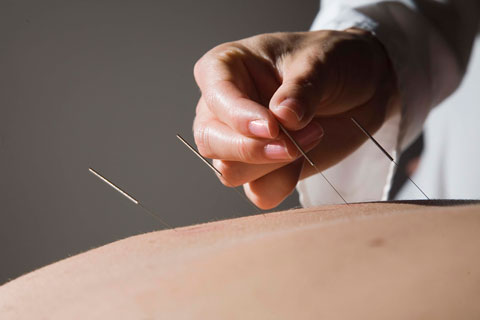
To further explore patient benefits, the clinic has set aside a group of patients receiving acupuncture that the clinic will track over time in order to evaluate long-term benefits such as actual reduction in medications used.
Internship Advantages
In addition to providing NUHS’ student interns with work experience in an integrative medical setting, interns in the Stroger clerkship also benefit from treating a wider variety of patient conditions than they might otherwise see in NUHS’ suburban campus clinic. The daily patient roster may include gunshot and burn victims, pre-surgical knee and shoulder patients, cancer patients with bone pain, cases of HIV neuropathy, diabetic neuropathy, stroke, headache and more.
“I wouldn’t trade this experience for anything,” says NUHS intern Greer Nesbitt, who will graduate with her Master of Science in Oriental Medicine degree this April. “We’re seeing real life situations that we wouldn’t experience at school. There is a wide range of different pathologies, and we’re forced to think outside the box and think very quickly. Since we’ve been there, the demand for our service is quadrupling. We have a lot of returning patients because it’s working, and doctors are referring more, especially in cases where nothing else seems to help.”
Fellow intern and MSOM classmate, Misty Blomquist, is impressed by the experience in integrative medicine her clerkship at Stroger offers. “All the physicians at Stroger have been great: they check in with us, make us feel welcome, and they’re teaching us the western aspects of diagnoses and pain management. I think we are receiving a broader education by experiencing acupuncture in a hospital environment.”
A third intern, Erica Garcia, says: “It definitely has opened up more future possibilities. I always knew working in a hospital was an option, but now I can see how practical it is. Dr. Yurasek is providing ideas and protocols that help us bring our acupuncture into this real world environment.” All three interns interviewed expressed a desire to practice hospital-based acupuncture in their future careers.
“Another benefit to the educational piece is that the education flows both ways,” says Dr. Torres. “Dr. Yurasek and the NUHS interns will provide review lectures for the rest of our staff on the proper use of and referral for acupuncture in patients with chronic pain.”
David Parish, DC, dean of clinics for NUHS, says: “We’ve been working hard to expand the number of hospital rotations and clerkships for our interns. We are very excited to have our acupuncture and oriental medicine students challenged by the dynamic environment provided by Stroger Hospital. We look forward to a long and successful partnership in providing care for the residents of Cook County.”
Historical Note:
The new acupuncture clerkship program serves as a historical reunion between the two institutions. In 1908, National’s founder, John Fitz Alan Howard, DC, relocated his National School of Chiropractic from Davenport, Iowa, to Chicago, partly because of an agreement with Cook County Hospital allowing his students to have access to anatomical study of their cadavers. National’s first facility was merely one block away from the hospital, and its students were admitted into the hospital’s diagnostic clinics and pathology laboratories from 1908 to 1925.
“It is good for our institutions, and especially for our patients, that Cook County Hospital and National University of Health Sciences have found a new way to work in a collegial setting once again,” says NUHS President James F. Winterstein, DC.
Today, John H. Stroger, Jr. Hospital of Cook County is a public urban teaching hospital in Chicago providing services to the five million residents of Cook County, Illinois. The hospital has a staff of 300 attending physicians along with more than 400 medical residents and fellows.
The 1.2 million-square-foot facility serves thousands of patients each week with the mission:”To provide a comprehensive program of quality health care with respect and dignity to the residents of Cook County, regardless of their ability to pay.” The fact that care is offered regardless of the patient’s ability to pay accounts for more than 400,000 outpatient visits to the hospital each year, including emergency room visits. In fact, the busy environment of Cook County Hospital formed the model for the fictitious “County General Hospital” featured in the NBC drama “ER.”

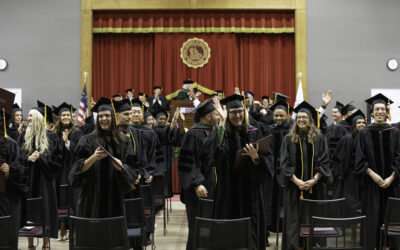
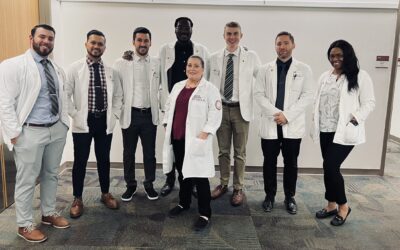
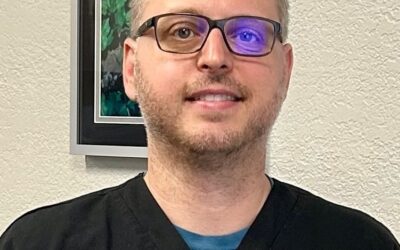
0 Comments